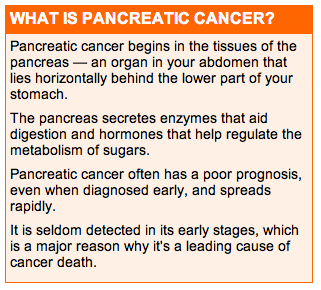
Patrick Swayze and Jennifer Grey
Pancreatic cancer is expected to become the second most common cause of cancer-related death in the United States in 2020, overtaking deaths from breast and colon cancers, according to new research.
The disease, which claimed the lives of both Steve Jobs and Patrick Swayze, is set for a ‘startling’ rise.
Currently, the top three causes of cancer-related death in the United States are lung, colorectal and breast cancers.
Pancreatic cancer is fourth, followed by prostate and liver cancers.
 In 2030, lung cancer will remain the top killer, but pancreatic cancer will move to second, followed by liver cancer and colorectal cancer, according to the report from the Pancreatic Cancer Action Network (PCAN).
In 2030, lung cancer will remain the top killer, but pancreatic cancer will move to second, followed by liver cancer and colorectal cancer, according to the report from the Pancreatic Cancer Action Network (PCAN).
In addition, the study reports that the number of thyroid cancer diagnoses is predicted to increase dramatically.
By combining predicted demographic changes and changes to the incidence and death rates of specific cancers, the Pancreatic Cancer Action Network was able to project numbers of diagnoses and deaths for major cancers in the US in the coming years.
Overall, it is encouraging that the cancer death rate in the US is declining each year, and the numbers of deaths caused by several major cancers such as lung, colorectal, and breast are following that trend and dropping, the researchers said.
However, they admit the increase in pancreatic cancer numbers was shocking.
‘The projections for deaths from pancreatic and liver cancers are startling,’ said Lynn Matrisian of the Pancreatic Cancer Action Network, and senior author of the paper.
‘This study is a call to action to the scientific and clinical communities, as well as the population at large, to increase attention, awareness, and ultimately progress in the fight against pancreatic cancer.’
There are many factors that have contributed to the lack of sufficient progress in the diagnosis and treatment of pancreatic cancer, researchers say.
Historically, the disease was understudied and underfunded.
In an effort to double pancreatic cancer survival by 2020, the Pancreatic Cancer Action Network is intensifying efforts to heighten awareness, raise funds for comprehensive private research, and advocate for dedicated federal research to advance early diagnostics, better treatments, and increase chances of survival.
Due to these efforts, The Recalcitrant Cancer Research Act was signed into law by President Obama in January 2013, which requires the National Cancer Institute (NCI) to develop a scientific framework to conduct and support research for recalcitrant cancers, including pancreatic and lung.
As a result of the law, the NCI issued a Scientific Framework for Pancreatic Ductal Adenocarcinoma in February 2014.
This report includes plans for implementation of the recommended initiatives toward making significant advances in pancreatic cancer research, diagnosis, and treatment.

Steve Jobs
The societal burden of these particularly deadly cancer types will become greater in the coming years, and now is the time to allocate the resources and effort necessary to alleviate the suffering caused by these diseases.
A recent report released by the American Society of Clinical Oncology (ASCO), State of Cancer Care in America: 2014, predicts that cancer will become the number one killer in the US by the year 2030.
‘This further emphasizes the urgency of making progress against pancreatic cancer, and other leading cancer killers,’ added Matrisian.
Written by Mark Prigg and published at The Daily Mail, May 20, 2014.
FAIR USE NOTICE: This site contains copyrighted material the use of which has not always been specifically authorized by the copyright owner. We are making such material available in our efforts to advance understanding of environmental, political, human rights, economic, democracy, scientific, and social justice issues, etc. We believe this constitutes a ‘fair use’ of any such copyrighted material as provided for in section 107 of the US Copyright Law. In accordance with Title 17 U. S. C. Section 107, the material on this site is distributed without profit to those who have expressed a prior interest in receiving the included information for research and educational purposes. For more information go to: http://www. law. cornell. edu/uscode/17/107. shtml“
